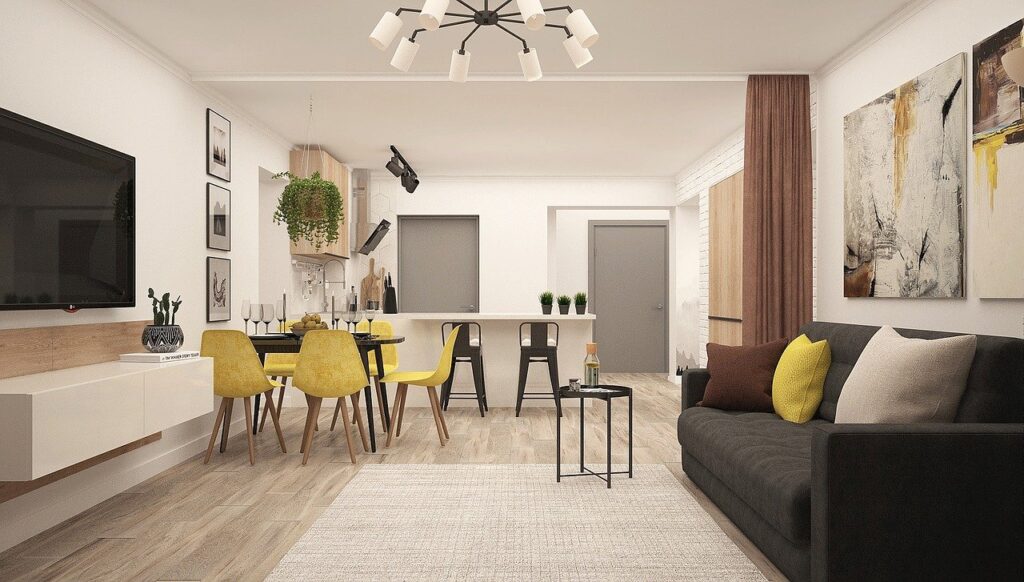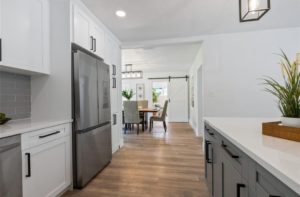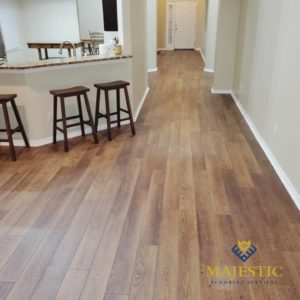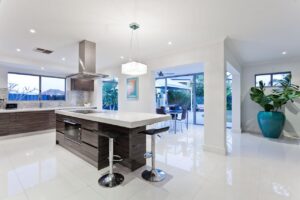
For a long while, vinyl was the last or near-last option for homeowners, but that isn’t the case anymore. With the high engineering process that vinyl undergoes to build a robust product, vinyl is a combination of the best features and qualities of different flooring types that give just the characteristics and qualities one will want at home.
Currently, vinyl plank flooring presents one of the most popular and effective flooring choices for busy households, cafes, offices, and other commercial places.
As a new homeowner, investor, or anyone looking to add equity to a property, you will likely come up against luxury vinyl and laminate as the ultimate choices to choose from on the market. These are options that you should seriously consider.
Laminate consists of 99% wood byproducts. It’s made up of rigid, high-density flip boards laminated together into planks.
Luxury vinyl, however, is made up of many layers of rigid PVC – Polyvinyl Chloride –with the top layer containing urethane. Further, luxury vinyl comes in 2 forms :Luxury Vinyl Planks (LVP) and Luxury Vinyl Tiles.
Luxury Vinyl Planks mimic the look of standard hardwood floors. Just like laminate, LVP or Luxury Vinyl Planks can float, snap, and be glued down. LVP’s are made to mimic the look of standard hardwood floors, Luxury Vinyl Tiles (or LVT’s) are made to mimic tile or stone. That said, LVP’s are the most common between LVP’s and LVT’s
While appearance is an excellent place to start, a crucial element to consider with flooring choice is performance. Take the kitchen as an example; it is one of the most trafficked spaces in any house. So, while aesthetics might rightly be a tempting consideration, performance is the more relevant factor.
Most of us do a lot of standing while cooking, which means a choice of flooring that gives sufficient comfort must be at the top of our priority considerations. The floor should also stand up to the foot traffic, which will likely be heavy in the kitchen. Lastly, you will want flooring to withstand the inevitable mess and spills that come with kitchen life.
Quite similar considerations generally apply to the choice of flooring for bathrooms as well. The floor of a bathroom should be one that can handle stress. The stress in question here? Water. No brainer, right? Water spills and seeps everywhere in the bathroom – ceiling, walls, everywhere. It is the exception and indeed an anomaly if any bathroom doesn’t have a water situation.
To summarize, three (3) factors that are vitally important in deciding on the flooring choice are performance, durability, and aesthetics. Other factors to consider if you are a homeowner are cost and ease of installation.
In this discussion, we talked about LVP. But let’s make this fair and objective. Why are we suggesting that you choose LVP instead of laminate or engineered hardwood, or even porcelain and ceramic tiles, for example?
Here’s an honest admission – these other alternatives have numerous pros worth mentioning. Let’s take a look at them.
Porcelain or Ceramic Tiles
Pro: Appearance and Aesthetic:
Let’s consider Porcelain or Ceramic Tiles. Porcelain is generally under the ceramic family and has some attractive features. It is as waterproof and affordable as vinyl. Porcelain tiles can have a rich, solid, and textured feeling. They also look great. But while porcelain tiles can give you many style options because of their ceramic quality and their ability to work well with radiant heating, Porcelain tiles have many cons.
Con: Porcelain is a little tough to handle
Porcelain tiles can get slippery, leaving you prone to accidents of varying degrees. Porcelain also feels cold under the feet. While this might appear insignificant, you do not want to walk on a floor that feels cold to the touch of your feet. Probably the most significant con of porcelain tiles, however, is that it is hard underfoot.
This characteristic makes it difficult to stand on for long periods. It is, therefore, not advisable to use porcelain in your kitchen, for example. Your knees and joints will not be happy with you. Porcelain also looks sterile, so under the category of aesthetics or appearance, it doesn’t entirely pass the test.
Engineered Hardwood

Pro: Durability and Performance:
Engineered hardwood is another viable option considered by homeowners for flooring. It is durable and can be guaranteed to last long – even for 30 to 50 years. This durability is because engineered hardwood is moisture-resistant. The spills in your kitchen and the water in your bathroom, for example, will not damage engineered hardwood. Further engineered hardwood can be resurfaced when they become scratched or worn.
Con: Reduced Air Quality and Cost
So why aren’t we suggesting engineered hardwood if it has all these pros? Let’s consider some cons of engineered hardwood since we’ve looked at some pros. The
first con to think about is that engineered hardwood is manufactured with resin adhesives.
Not to turn this into a science class, note that these are organic compounds that convert to gas when subjected to room temperature in a process called off-gassing. This process implies that the air quality of the space, which has been floored with engineered hardwood and the home, by extension, can be negatively impacted.
This impact on air quality is not what you will ideally want for your home.
Also, while engineered hardwood can be resurfaced when scratched or worn, it is difficult to replace a plank when damaged. The biggest con for most people, however, might be the expensive nature of this flooring type. Engineered hardwood is among the costliest options for flooring types. Homeowners might therefore
consider and prioritize other more affordable options.
Laminate
Pro: Cost Effective and Easy to Care
Laminate is an excellent choice for people who are looking at cutting costs. It can also handle heavy traffic. The appearance of laminate is good enough to be compared to the best alternatives out there, with the manufacturing techniques of laminate providing various textures.
Laminate is also easy to care for compared to other floor types. It is excellent for the environment and doesn’t easily trap dust and dirt. Further, spills are easy to clean on laminate.
Cons: Not Waterproof and Diminished Resale Value
What about the cons of laminate? Let’s start with the waterproof quality. Though laminate is water-resistant, especially at the top, the fiberboard at the bottom layers quickly absorbs water.
So, while it might be water-resistant to some extent, it is not exactly waterproof. This quality means the laminate is not the go-to choose if you want the floor for your bathroom.
Also, if you are looking for resale value as an investor, laminate might not be the choice of floor to install. This lack of favorability is because appraisers are not easily impressed by laminate. Though high-quality laminate can only slightly increase the value of your property, a low-quality version of laminate negatively affects the value of a property.
Luxury Vinyl

So, let’s consider Luxury vinyl. If you have read this far, you know we are a big fan of Luxury vinyl and we highly recommend that you choose it when installing a floor for your home as a homeowner. But why are we so sure about this?
Pros: All Around Best Option
Why choose luxury vinyl over the other available floor types? Luxury vinyl is better for resale value, durability, water absorption, waterproof quality, and repair and maintenance.
Cons: Affordability
Let’s get the cons of Luxury Vinyl out of the way; luxury vinyl is not the most affordable floor type out there. It might not be the most expensive either, but other floor types, such as laminate, are more affordable than luxury vinyl. Further, luxury vinyl is not the best floor type for the environment, even though it is ready to care for it.
Nonetheless, despite these issues, the pros of Luxury Vinyl far outweigh its cons. Manufacturing advances have made vinyl depart from its trademark plastic look with more detailed textures besides smooth and shiny.
Also, because luxury vinyl is generally smooth and waterproof, it is easy to clean. Its waterproof feature also means that you don’t have to stress when training dogs, cats, and pets. Pet hairs are also easily removed from luxury vinyl floors. Further, because the luxury vinyl floors are scratch-resistant, the nail scratches of pets will be the least of your worries.
Another positive quality of luxury vinyl is its huge DIY installation potential. Even though LVP is glue-able, you can install it on existing floors without glue or nails. It
can also stick directly on smooth surfaces. For durability, luxury vinyl floors often come with 15 years warranty. This warranty gives you some idea of how durable it is.
Conclusion
The choice of floor type you decide on takes some consideration. In this article, we have shown you why you should consider Luxury Vinyl Planks over other alternatives.
Ready to upgrade your home? Get in touch with us if you have any more inquirie



Good post. I learn something new and challenging on blogs I stumbleupon everyday. It will always be interesting to read articles from other authors and use a little something from their sites.